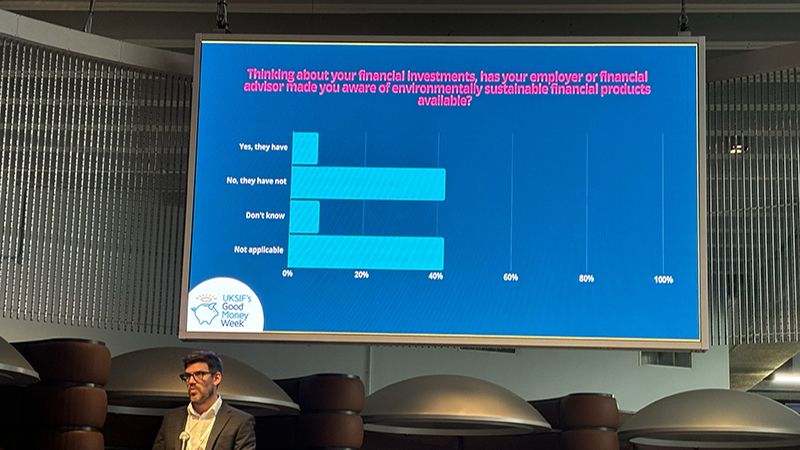Speakers at the UKSIF Good Money Week event on 2 October shared some tips with advisers on how to ensure clients understand terminology around sustainable investing, and ensure both parties understand the approach needed to get the best from portfolios.
First, in the fireside chat – How to talk to clients about sustainable investing – chief executive of UKSIF,James Alexander, spoke to head of ethical, sustainable and impact research at Greenbank Kate Elliot about the challenges of educating clients about sustainable investments and the language used.
Elliot said she has noticed “although clients care deeply about social and environmental issues, they do not know how to approach it.” Alexander asked her the best way to educate clients, and she recounted: “During an event, the hosts gave the audience red cards. The instructions are that at any point the speaker says something you don’t understand, raise the red card and the speaker will go back over and explain the concept/term. It was eye-opening way to avoid people sitting there in silence.”
Further, Elliot said understanding the client’s broad financial and moral objectives is important, and how to align investments with these objectives. Once the firm understands this, they “propose companies that sit along the broad spectrum of appetite risks” and tailor the best investment portfolio for their client.
Alexander asked how the firm engages with clients once their appetite risks are understood, and how they provide them with a sustainable offer. Elliot replied: “There needs to be an honest conversation with clients about what is achievable to avoid an incredibly low-risk portfolio. This is what we believe as a firm. We credit the offer, and the client makes an informed choice on what investments align with their values.”
Meanwhile, UKSIF’s Alexander, also revealed results from polls the firm have been conducting with consumers.
He revealed that 60% of people do not know if their investment are environmentally sustainable and have not been made aware of available sustainable investment products by their advisors. Further, results revealed respondents favour financial returns over making a ‘positive difference’ in the world.
In order to change this attitude, he shared five tips for firms to better understand how to approach clients about sustainable investing. The first is to “get away from acronyms” that can confuse clients, the second is to “not engage in greenhushing and educate clients how they can direct their capital to sustainable investments,” the third is to “help clients understand the risks involved in sustainable investing, fourth “to focus on topics that align with the client’s morals and interests,” and finally, “to remove mistrust about sustainability, such as corporate greenwashing, and be transparent with marketing products.”








